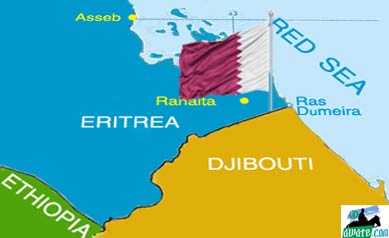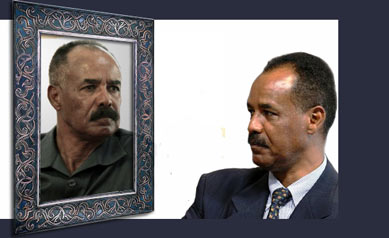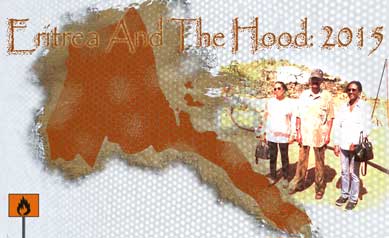Just Don’t Call It A War: People May Get Ideas

This article originally appeared at awate on June 27, 2008. It is being republished in light of recent news that Eritrea has, after 7 years, released Djibouti prisoners of war.
I. The Djibouti “Fabrication”?
Djibouti. We have seen this movie before. Twice. In 1995 and 1998.
The atmospherics is the same: it has an eerie, haunting familiarity to it. The government is not saying much? It is standard operating procedure (SOP) from the PFDJ manual (Chaper sQta Verse meritSna). This silence helps it avoid making any contradictory statements. The silence gives the government the appearance of being restrained and reflective. How sober and farsighted! Maybe too damn quiet for its own good. It is charming as hell. People either congratulate it for its foresight or want to volunteer their services to repair its tiny imperfections, its noble refusal to defend itself. Until the books are opened, years later.
The conflict with Djibouti is a product of a management theory popularized by Donald Rumsfeld: “If a problem cannot be solved, enlarge it.” In this case, the problem that couldn’t be solved is the border issue with Ethiopia (what the UN likes to call “the situation between Eritrea and Ethiopia”), and one way to enlarge it is to include all of Ethiopia’s real and perceived friends in the enemy list. Djibouti is just the latest. If Somaliland doesn’t watch it….
Did I mention Rumsfeld. Oh, yes, talking about Rummy, and related to Eritrea-US and, therefore, Eritrea-Ethiopia, Eritrea-Sudan, Eritrea-Somalia, and Eritrea-Djibouti relationship…and definitely related to the subject at hand. The happiest picture of Isaias Afwerki was taken in 2002. He had just concluded a meeting with Rummy in Asmara, followed by a press conference and there was that image of the handshake…it was like Isaias had, at long last, found his soul mate. A soul mate who believes in the sovereign right of dictatorships to be dictatorial. But whatever Rummy promised Isaias in that meeting, he couldn’t deliver… he delivered it to the wrong country: Djibouti!
Silence. What we could only know in hindsight is the truth that every parent knows: when a child is silent, and not responding to a call, it is not always because the child is too busy studying. It might be because his mouth is full of pilfered cookies and candy. Similarly, the Eritrean government’s silence is not a reflective act; it is abstention from commenting on an impulsive (and probably illegal) act already taken. Its silence is driven by fear of being caught in contradictions; it is knowledge of Miranda Right, knowledge that “anything you say can and will be used against you.”
In contrast, its victimized opponents are too angry and too provoked to be restrained. In 1995, Yemen appeared shrill, boastful, addicted to ultimatums, eager for war, eager to expand the conflict into an Arab vs Africa conflict. Meanwhile, Eritrea appeared tight-lipped, a model of self-restraint, headed by a government of war-weary folks, reluctant warriors eager for peace and compromise.
Appeared.
In 1998, the image of Ethiopia was scary: it was loud, annoyed, war-mongering, carrying out deportations and threatening to do so using any arbitrary criteria. But Eritreans were apparently adorable: just innocent and stung people wondering what we could have done to deserve this unprovoked hostility.
Apparently.
And now look at Djibouti. Look at how all its advocates in the UN, the AU, the Arab League, the Islamic Conference, IGAD, the US, France, are all picking on little Eritrea. It is a recipe for the creation of the underdog—you might as well fire up the soundtrack to Rocky.
It is all a mirage, and the truth can’t be seen clearly now–not when there is what Professor Julius Stone called “Nationalization of Truth”: the tendency for war to produce two sets of truth each wrapped in a national flag.
So very few are immune to “nationalization of truth”–the tendency to believe the stories of people who are most like you over people who are most unlike you. “Not even the man who coined the phrase, Professor Stone himself, is immune to it,” would say a Palestinian, who has seen Julius Stone’s 1980 treatise on the Arab Israeli conflict, which looks like it was written by the Likud Party.
But, in time, we will know the truth. And the truth is never flattering to the PFDJ.
But it hasn’t mattered so far because by the time the historians, the fact-finding teams and the judges tell us what really happened, it will have been years since the crisis and we will have moved on. This is why the Eritrean government stalls and refuses to admit fact-finding teams (example here) and, when they do issue their findings, they are reminded that their findings are confidential. (example here.)
The claim that poor, innocent, harmless, peace-loving Eritrean government which hates war because it has experienced it first hand, etc etc was all a mirage. We now know that in December 1995, and in the months that followed, while we were so impressed by the government’s dignified silence, it was doing horrendous things to Yemen. Refer to Professor Jeffrey Lefebvre’s “Red Sea Security And The Geopolitical-Economy of The Hanish Islands Dispute” (Middle East Journal, Volume 52, No 3.):
We also now know, thanks to the Eritrea Ethiopia Claims Commission, what our government was up to in May 1998 when we were so impressed by its self-restraint. At “…5:30 AM on May 12, Eritrean armed forces comprised of two brigades of regular soldiers using tanks and artillery attacked the town of Badme and several other border areas in Ethiopia’s Tahetay Adiabo Wereda as well as at least two places in Laelay Adiabo Wereda…” Therefore, “Eritrea violated Article 2, Paragraph 4 of the Charter of the United Nations….and is liable to compensate Ethiopia for the damages caused by that violation of international law.”
Time (and the fact that the government has total media monopoly and no opposition) makes us forget. By the time Yemen raised its flag over Greater Hanish on November 1, 1998, we were already at war with Ethiopia. There was no accountability at all for this disaster; as a matter of fact, it was a “win-win” because three years into the war, the question was no longer, “how did the government stumble into this mess?” but, “how well is it representing Eritrea’s case in the arbitration!” and, lastly, “how gracefully has it accepted a ruling!” It sought not forgiveness for a policy that resulted in the unnecessary death of 12 Eritreans; it sought congratulations for its fidelity to the rule of law and its commitment to abide by The Hague’s ruling.
And by the time we received the EEBC’s jus ad bellum ruling of December 19, 2005, we were already well on our way to finding the Founding Fathers of Sudan 3.0 (New Sudan) and Somalia 10.0 (post-post-post-post reconciliation).
Did the EEBC’s jus ad bellum ruling result in resignations within the Eritrean government? No. Was it discussed at the national assembly? No. Did the media give a full airing of people’s opinions? No.
We don’t have accountability because we are good at denial. Remember, we Eritreans don’t have wars. No! We “struggle” (the official name of our Revolutionary War was “armed struggle”); we have a “crisis” (the official name for the war with Yemen was the “Hanish Crisis”); and we have a “conflict” (the official name for the wars with Ethiopia is the “Eritrea-Ethiopia Border Conflict.”) Whatever it is we are having with Djibouti now (confusion? fabrication?), just don’t call it a war, because people may get ideas. After all, you really can’t hold anybody accountable for a confusion or fabrication can you?
Our Dear Opposition
Governments that make blunders this size present opposition…do we have an opposition?
If you have an opposition that makes news only when it meets, do you have an opposition? If there is no difference in how the opposition reacts in relation to how the government acts, do you have an opposition?
If Isaias Afwerki’s management philosophy is “to solve a problem, enlarge it”, what is that of the opposition? I think their philosophy is “better like this or better like this?” Let me explain:
You are sitting on a reclining chair and staring at an image through revolving lenses. Standing behind you is the optometrist, looking for the right lens for your prescription. He is going through his iteration process and asking the same question: “better like this or” click “better like this?” Over and over. You peer through lens 1, and then lens 2, back to lens 1 and, of course, there isn’t a single difference between his first “this” and second “this.” And, if you can’t make a decision, if you are looking for that perfect vision, you can be there forever.
That is our opposition. Every now and then they splinter, multiply and re-organize and, in their minds, they think they have made radical, life-altering changes, and they ask us “better like this? or better like this?”. But we really can’t see anything different. And they just won’t stop asking.
Maybe we don’t need glasses. Maybe the problem is not our vision or eyesight but what we are being asked to see. Or, in the case of the Eritrean government, what we are being ordered to see. Damn, maybe we don’t need glasses or optometrist: we are just tired of pretending that the same old thing we rejected is something new.



Awate Forum